Assessing Dividend Decisions in Omani Corporations (2010-2016)
VerifiedAdded on 2020/04/15
|5
|1127
|136
AI Summary
The research paper examines the determinants of dividend policy within Omani firms listed in the Muscat Security Market (MSM 30 Index). It highlights how Oman's distinctive economic conditions—such as significant contributions from the financial sector to GDP, the absence of taxes on dividends, and reliance on bank financing—affect corporate dividend strategies. The paper critiques traditional theories such as Modigliani-Miller by considering these unique factors and assesses how they might lead to different approaches in dividend payout stability and decisions between non-financial and financial companies from 2010 to 2016. By leveraging various academic perspectives, the study aims to provide a comprehensive understanding of how Oman's economic environment influences corporate finance behavior regarding dividends.
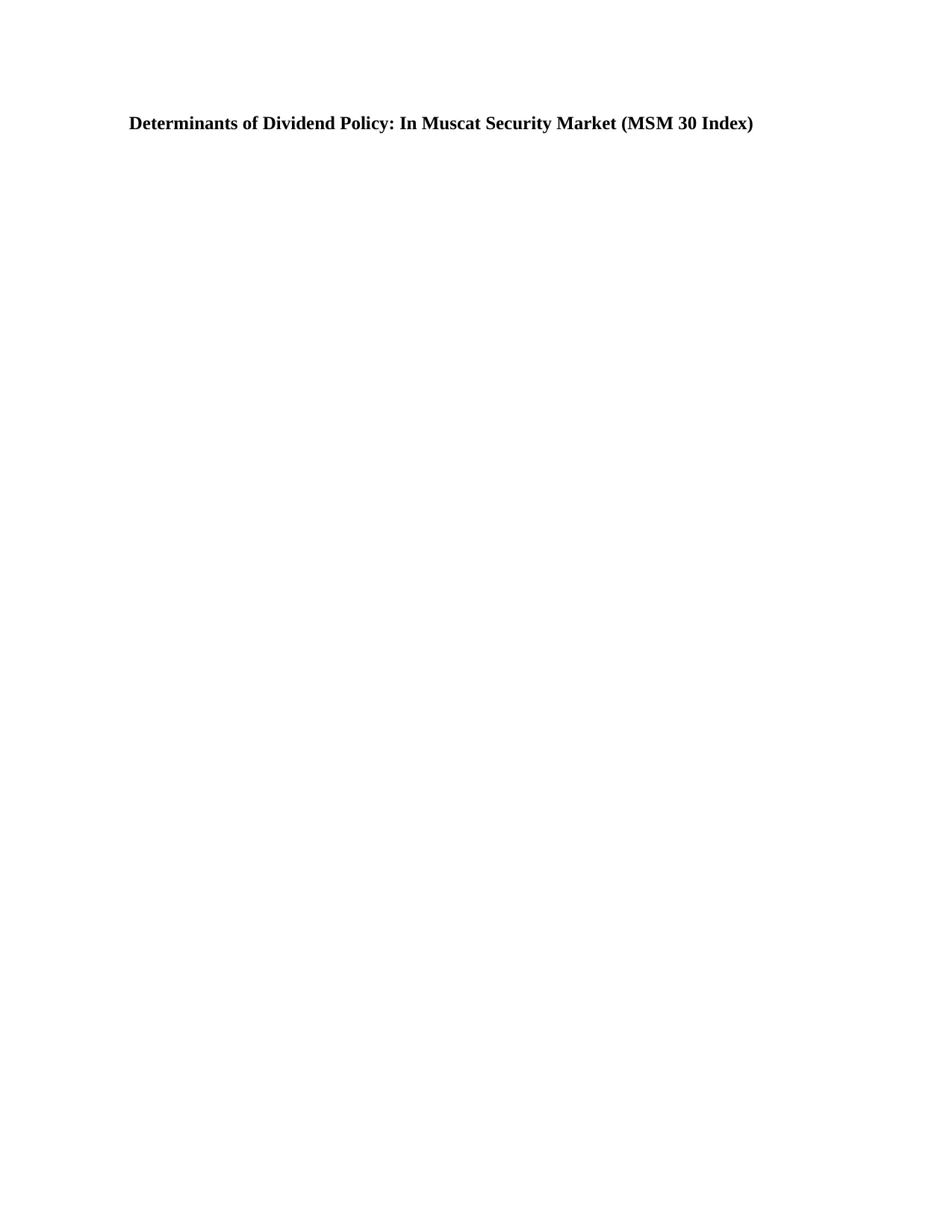
Determinants of Dividend Policy: In Muscat Security Market (MSM 30 Index)
Paraphrase This Document
Need a fresh take? Get an instant paraphrase of this document with our AI Paraphraser
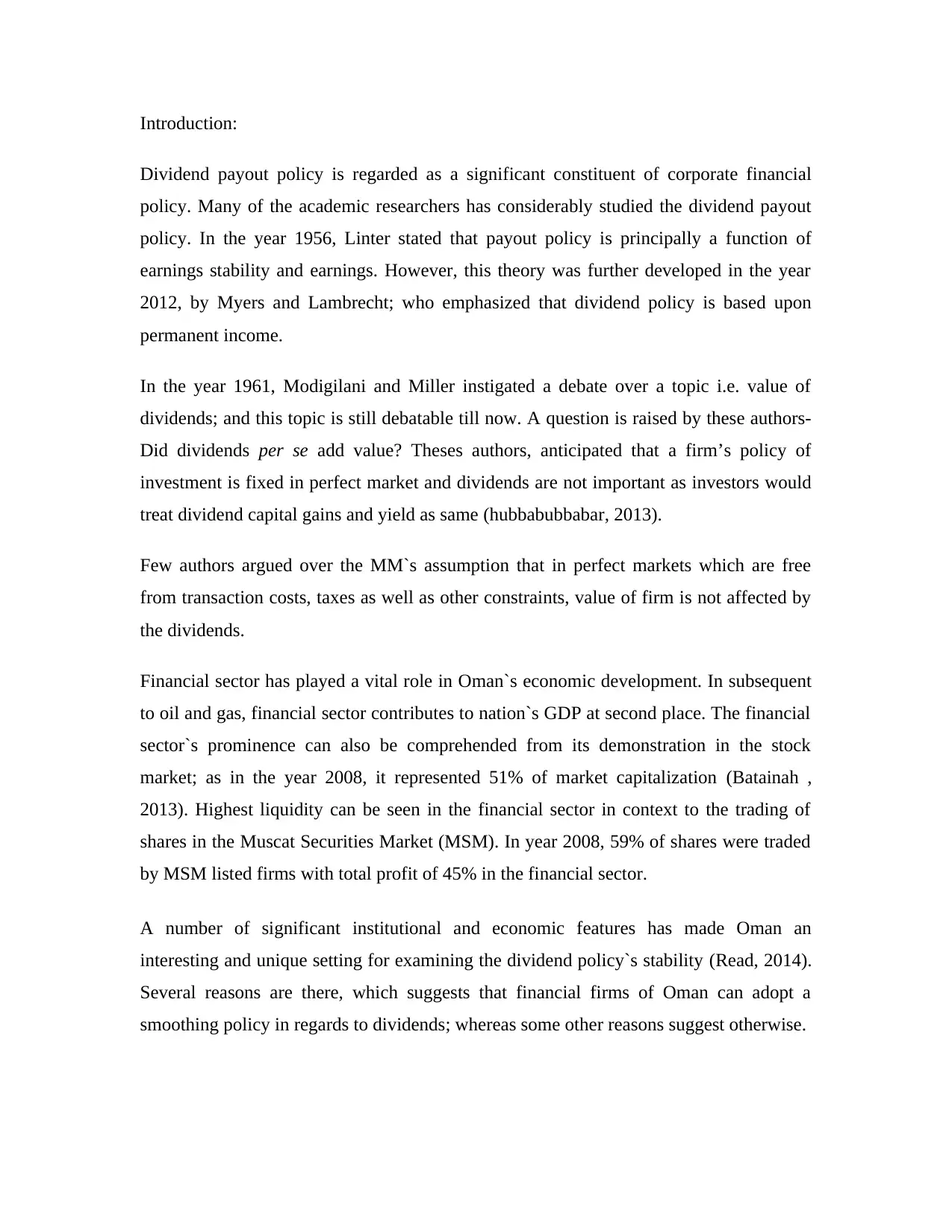
Introduction:
Dividend payout policy is regarded as a significant constituent of corporate financial
policy. Many of the academic researchers has considerably studied the dividend payout
policy. In the year 1956, Linter stated that payout policy is principally a function of
earnings stability and earnings. However, this theory was further developed in the year
2012, by Myers and Lambrecht; who emphasized that dividend policy is based upon
permanent income.
In the year 1961, Modigilani and Miller instigated a debate over a topic i.e. value of
dividends; and this topic is still debatable till now. A question is raised by these authors-
Did dividends per se add value? Theses authors, anticipated that a firm’s policy of
investment is fixed in perfect market and dividends are not important as investors would
treat dividend capital gains and yield as same (hubbabubbabar, 2013).
Few authors argued over the MM`s assumption that in perfect markets which are free
from transaction costs, taxes as well as other constraints, value of firm is not affected by
the dividends.
Financial sector has played a vital role in Oman`s economic development. In subsequent
to oil and gas, financial sector contributes to nation`s GDP at second place. The financial
sector`s prominence can also be comprehended from its demonstration in the stock
market; as in the year 2008, it represented 51% of market capitalization (Batainah ,
2013). Highest liquidity can be seen in the financial sector in context to the trading of
shares in the Muscat Securities Market (MSM). In year 2008, 59% of shares were traded
by MSM listed firms with total profit of 45% in the financial sector.
A number of significant institutional and economic features has made Oman an
interesting and unique setting for examining the dividend policy`s stability (Read, 2014).
Several reasons are there, which suggests that financial firms of Oman can adopt a
smoothing policy in regards to dividends; whereas some other reasons suggest otherwise.
Dividend payout policy is regarded as a significant constituent of corporate financial
policy. Many of the academic researchers has considerably studied the dividend payout
policy. In the year 1956, Linter stated that payout policy is principally a function of
earnings stability and earnings. However, this theory was further developed in the year
2012, by Myers and Lambrecht; who emphasized that dividend policy is based upon
permanent income.
In the year 1961, Modigilani and Miller instigated a debate over a topic i.e. value of
dividends; and this topic is still debatable till now. A question is raised by these authors-
Did dividends per se add value? Theses authors, anticipated that a firm’s policy of
investment is fixed in perfect market and dividends are not important as investors would
treat dividend capital gains and yield as same (hubbabubbabar, 2013).
Few authors argued over the MM`s assumption that in perfect markets which are free
from transaction costs, taxes as well as other constraints, value of firm is not affected by
the dividends.
Financial sector has played a vital role in Oman`s economic development. In subsequent
to oil and gas, financial sector contributes to nation`s GDP at second place. The financial
sector`s prominence can also be comprehended from its demonstration in the stock
market; as in the year 2008, it represented 51% of market capitalization (Batainah ,
2013). Highest liquidity can be seen in the financial sector in context to the trading of
shares in the Muscat Securities Market (MSM). In year 2008, 59% of shares were traded
by MSM listed firms with total profit of 45% in the financial sector.
A number of significant institutional and economic features has made Oman an
interesting and unique setting for examining the dividend policy`s stability (Read, 2014).
Several reasons are there, which suggests that financial firms of Oman can adopt a
smoothing policy in regards to dividends; whereas some other reasons suggest otherwise.
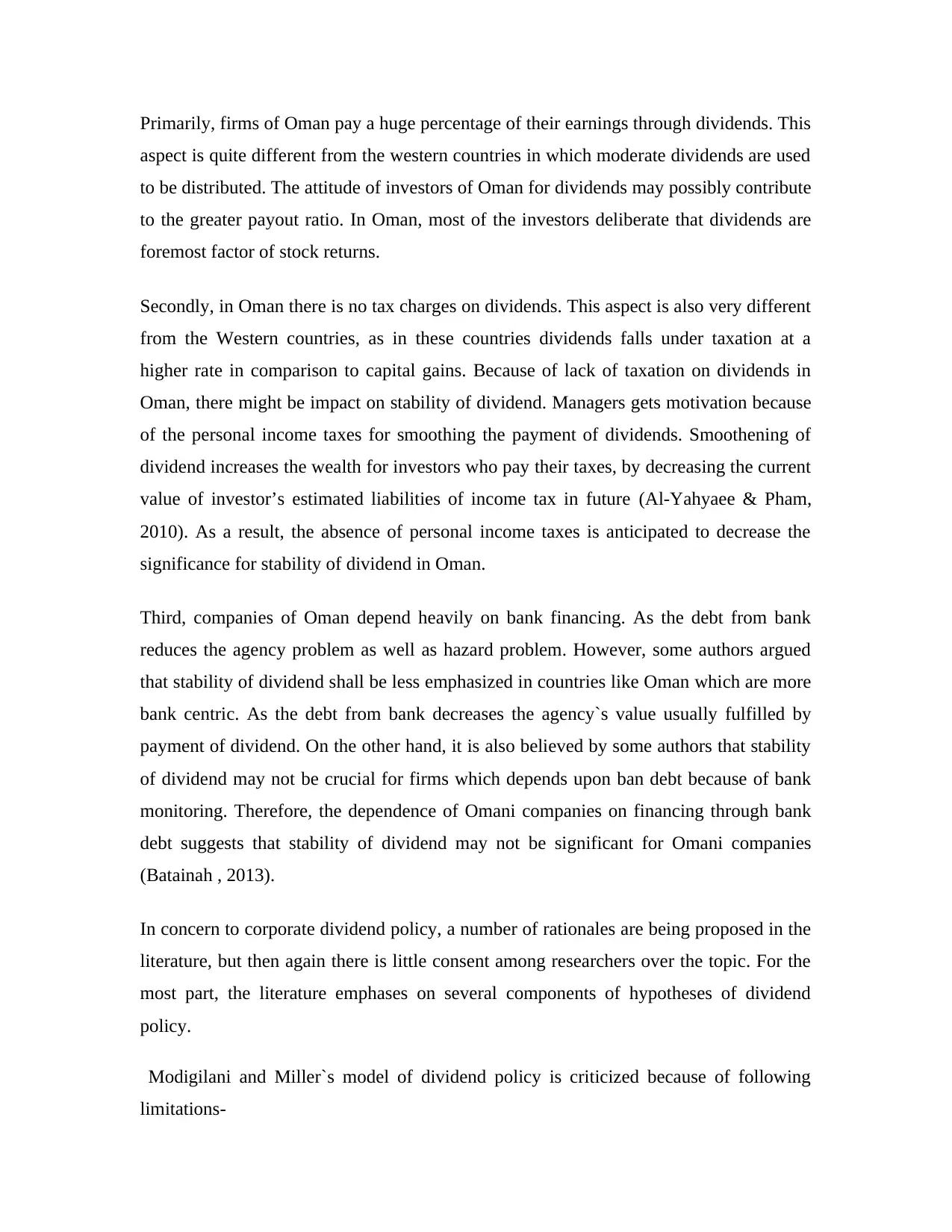
Primarily, firms of Oman pay a huge percentage of their earnings through dividends. This
aspect is quite different from the western countries in which moderate dividends are used
to be distributed. The attitude of investors of Oman for dividends may possibly contribute
to the greater payout ratio. In Oman, most of the investors deliberate that dividends are
foremost factor of stock returns.
Secondly, in Oman there is no tax charges on dividends. This aspect is also very different
from the Western countries, as in these countries dividends falls under taxation at a
higher rate in comparison to capital gains. Because of lack of taxation on dividends in
Oman, there might be impact on stability of dividend. Managers gets motivation because
of the personal income taxes for smoothing the payment of dividends. Smoothening of
dividend increases the wealth for investors who pay their taxes, by decreasing the current
value of investor’s estimated liabilities of income tax in future (Al-Yahyaee & Pham,
2010). As a result, the absence of personal income taxes is anticipated to decrease the
significance for stability of dividend in Oman.
Third, companies of Oman depend heavily on bank financing. As the debt from bank
reduces the agency problem as well as hazard problem. However, some authors argued
that stability of dividend shall be less emphasized in countries like Oman which are more
bank centric. As the debt from bank decreases the agency`s value usually fulfilled by
payment of dividend. On the other hand, it is also believed by some authors that stability
of dividend may not be crucial for firms which depends upon ban debt because of bank
monitoring. Therefore, the dependence of Omani companies on financing through bank
debt suggests that stability of dividend may not be significant for Omani companies
(Batainah , 2013).
In concern to corporate dividend policy, a number of rationales are being proposed in the
literature, but then again there is little consent among researchers over the topic. For the
most part, the literature emphases on several components of hypotheses of dividend
policy.
Modigilani and Miller`s model of dividend policy is criticized because of following
limitations-
aspect is quite different from the western countries in which moderate dividends are used
to be distributed. The attitude of investors of Oman for dividends may possibly contribute
to the greater payout ratio. In Oman, most of the investors deliberate that dividends are
foremost factor of stock returns.
Secondly, in Oman there is no tax charges on dividends. This aspect is also very different
from the Western countries, as in these countries dividends falls under taxation at a
higher rate in comparison to capital gains. Because of lack of taxation on dividends in
Oman, there might be impact on stability of dividend. Managers gets motivation because
of the personal income taxes for smoothing the payment of dividends. Smoothening of
dividend increases the wealth for investors who pay their taxes, by decreasing the current
value of investor’s estimated liabilities of income tax in future (Al-Yahyaee & Pham,
2010). As a result, the absence of personal income taxes is anticipated to decrease the
significance for stability of dividend in Oman.
Third, companies of Oman depend heavily on bank financing. As the debt from bank
reduces the agency problem as well as hazard problem. However, some authors argued
that stability of dividend shall be less emphasized in countries like Oman which are more
bank centric. As the debt from bank decreases the agency`s value usually fulfilled by
payment of dividend. On the other hand, it is also believed by some authors that stability
of dividend may not be crucial for firms which depends upon ban debt because of bank
monitoring. Therefore, the dependence of Omani companies on financing through bank
debt suggests that stability of dividend may not be significant for Omani companies
(Batainah , 2013).
In concern to corporate dividend policy, a number of rationales are being proposed in the
literature, but then again there is little consent among researchers over the topic. For the
most part, the literature emphases on several components of hypotheses of dividend
policy.
Modigilani and Miller`s model of dividend policy is criticized because of following
limitations-
⊘ This is a preview!⊘
Do you want full access?
Subscribe today to unlock all pages.

Trusted by 1+ million students worldwide
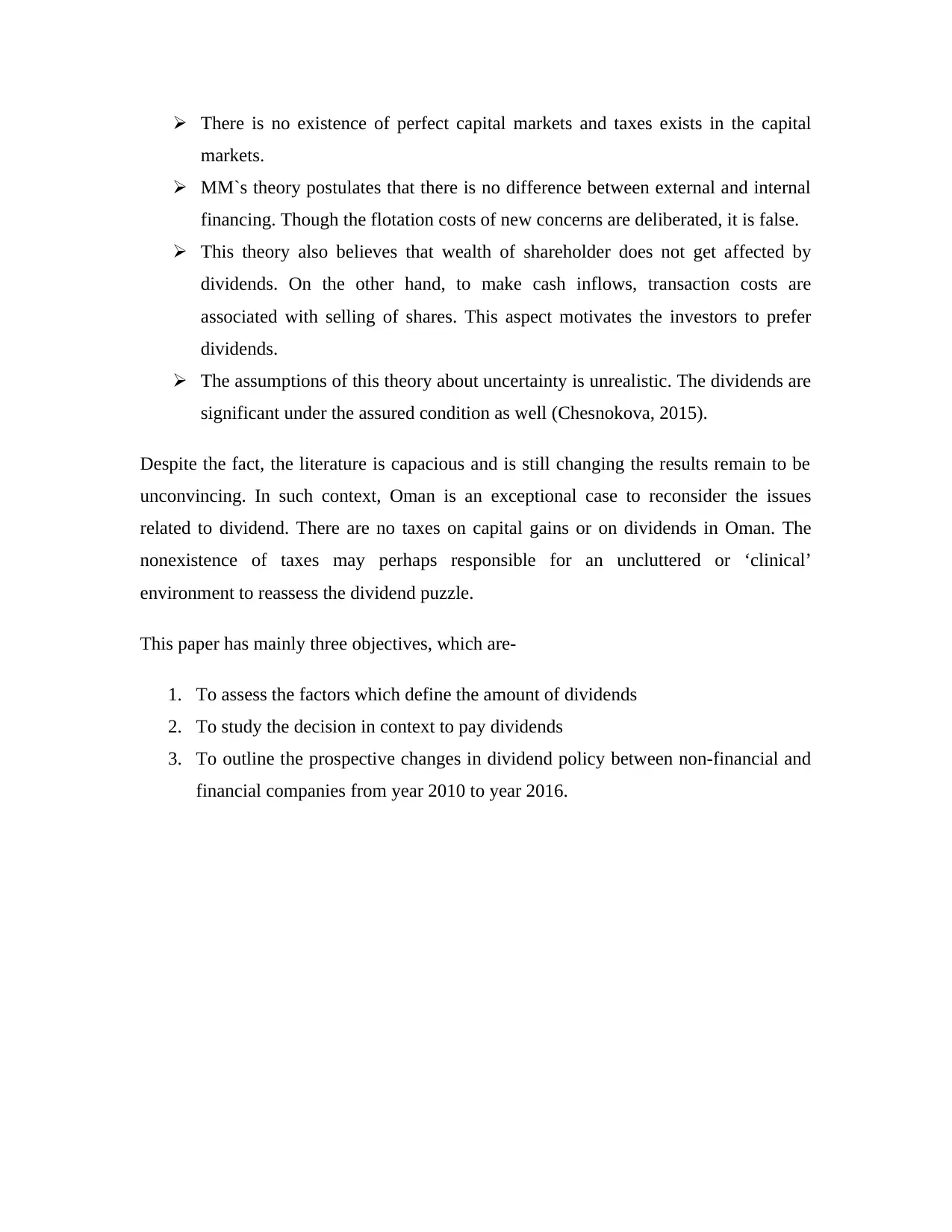
There is no existence of perfect capital markets and taxes exists in the capital
markets.
MM`s theory postulates that there is no difference between external and internal
financing. Though the flotation costs of new concerns are deliberated, it is false.
This theory also believes that wealth of shareholder does not get affected by
dividends. On the other hand, to make cash inflows, transaction costs are
associated with selling of shares. This aspect motivates the investors to prefer
dividends.
The assumptions of this theory about uncertainty is unrealistic. The dividends are
significant under the assured condition as well (Chesnokova, 2015).
Despite the fact, the literature is capacious and is still changing the results remain to be
unconvincing. In such context, Oman is an exceptional case to reconsider the issues
related to dividend. There are no taxes on capital gains or on dividends in Oman. The
nonexistence of taxes may perhaps responsible for an uncluttered or ‘clinical’
environment to reassess the dividend puzzle.
This paper has mainly three objectives, which are-
1. To assess the factors which define the amount of dividends
2. To study the decision in context to pay dividends
3. To outline the prospective changes in dividend policy between non-financial and
financial companies from year 2010 to year 2016.
markets.
MM`s theory postulates that there is no difference between external and internal
financing. Though the flotation costs of new concerns are deliberated, it is false.
This theory also believes that wealth of shareholder does not get affected by
dividends. On the other hand, to make cash inflows, transaction costs are
associated with selling of shares. This aspect motivates the investors to prefer
dividends.
The assumptions of this theory about uncertainty is unrealistic. The dividends are
significant under the assured condition as well (Chesnokova, 2015).
Despite the fact, the literature is capacious and is still changing the results remain to be
unconvincing. In such context, Oman is an exceptional case to reconsider the issues
related to dividend. There are no taxes on capital gains or on dividends in Oman. The
nonexistence of taxes may perhaps responsible for an uncluttered or ‘clinical’
environment to reassess the dividend puzzle.
This paper has mainly three objectives, which are-
1. To assess the factors which define the amount of dividends
2. To study the decision in context to pay dividends
3. To outline the prospective changes in dividend policy between non-financial and
financial companies from year 2010 to year 2016.
Paraphrase This Document
Need a fresh take? Get an instant paraphrase of this document with our AI Paraphraser
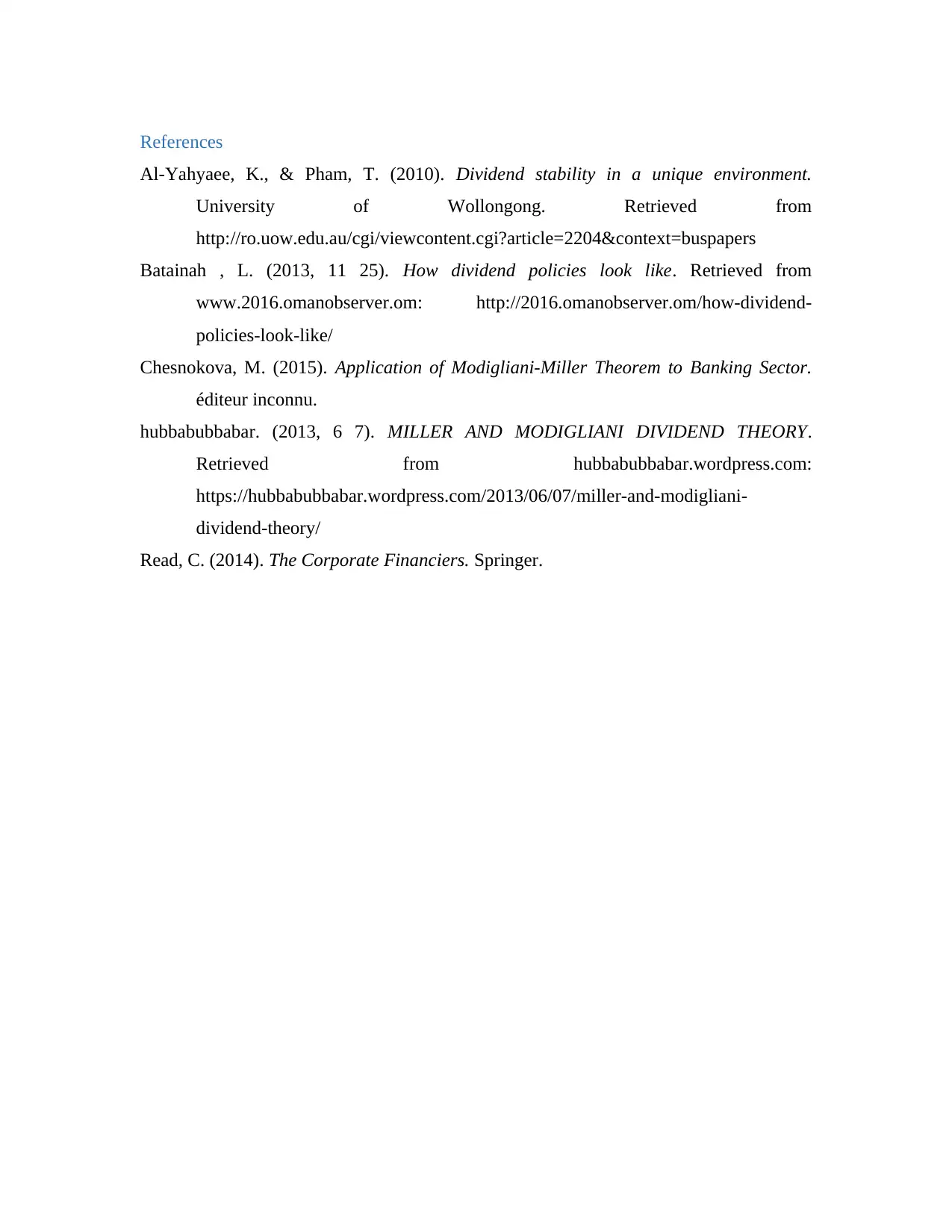
References
Al-Yahyaee, K., & Pham, T. (2010). Dividend stability in a unique environment.
University of Wollongong. Retrieved from
http://ro.uow.edu.au/cgi/viewcontent.cgi?article=2204&context=buspapers
Batainah , L. (2013, 11 25). How dividend policies look like. Retrieved from
www.2016.omanobserver.om: http://2016.omanobserver.om/how-dividend-
policies-look-like/
Chesnokova, M. (2015). Application of Modigliani-Miller Theorem to Banking Sector.
éditeur inconnu.
hubbabubbabar. (2013, 6 7). MILLER AND MODIGLIANI DIVIDEND THEORY.
Retrieved from hubbabubbabar.wordpress.com:
https://hubbabubbabar.wordpress.com/2013/06/07/miller-and-modigliani-
dividend-theory/
Read, C. (2014). The Corporate Financiers. Springer.
Al-Yahyaee, K., & Pham, T. (2010). Dividend stability in a unique environment.
University of Wollongong. Retrieved from
http://ro.uow.edu.au/cgi/viewcontent.cgi?article=2204&context=buspapers
Batainah , L. (2013, 11 25). How dividend policies look like. Retrieved from
www.2016.omanobserver.om: http://2016.omanobserver.om/how-dividend-
policies-look-like/
Chesnokova, M. (2015). Application of Modigliani-Miller Theorem to Banking Sector.
éditeur inconnu.
hubbabubbabar. (2013, 6 7). MILLER AND MODIGLIANI DIVIDEND THEORY.
Retrieved from hubbabubbabar.wordpress.com:
https://hubbabubbabar.wordpress.com/2013/06/07/miller-and-modigliani-
dividend-theory/
Read, C. (2014). The Corporate Financiers. Springer.
1 out of 5
Related Documents
Your All-in-One AI-Powered Toolkit for Academic Success.
+13062052269
info@desklib.com
Available 24*7 on WhatsApp / Email
![[object Object]](/_next/static/media/star-bottom.7253800d.svg)
Unlock your academic potential
Copyright © 2020–2025 A2Z Services. All Rights Reserved. Developed and managed by ZUCOL.





